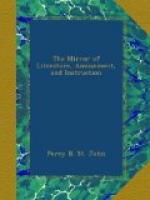A “certain exalted personage,” as the newspapers would say, commanded the attendance of a physician, who was only a Licentiate, and, thereby, struck consternation throughout the whole body of “Fellows.” The great men already in attendance were dreadfully alarmed and confounded by this terrible subversion of established College etiquette. “Sire!” said one of them, “we humbly acquaint your Majesty, with all dutiful submission that as Dr.—— is not a Fellow, it is contrary to rule and custom to meet him in attendance here.”—“A Fellow?” asked his Majesty; “what mean ye?” The learned physician explained. “Well, make him a Fellow, then,” was his Majesty’s quick reply; and he was accordingly made one!
* * * * *
CULTIVATION OF WASTE LANDS.
No man at all acquainted with the principles of fertility and the present state of British tillage, can for a moment doubt that a very large quantity of waste land is scattered over the different districts of this country, which is not only susceptible of improvement, but which would yield an ample return for any amount of labour which could, for centuries to come, be spared from the cultivation of our own land. To be fully convinced of this fact, no man need do more than ride twenty miles in any direction from the metropolis. Let him select whatever road he may choose for his excursion, and he will find tracts of land, forming in the aggregate a very considerable quantity, which at this moment remain in the hands of nature—which man has never made the slightest effort to reclaim. Even the hebdomadal excursions of the citizen will conduct him over or near many such scenes. What Gilpin, living within the sound of Bow-bells, does not know Epping and Hainault Forests, Hounslow, Putney, and Black Heaths, Brook Green, Turnham Green, Wandsworth, Esher, Sydenham, Hays, and various other Commons? Within a circle of twenty miles around the largest and most opulent city in the world, we thus discover a large quantity of land, which cultivation would render highly productive, but which, in its present state of waste, is of little or no value to the public. And this land, situated in the very outskirts of the metropolis, continues to be utterly neglected, if not entirely overlooked, at a moment when the whole kingdom resounds with the groans of those who argue that the population of this country has outrun the means of subsisting them. As the traveller advances in his journey from the metropolis, the waste becomes more extensive, if not more numerous. The English wastes, which amount to about five millions of acres, are more valuable than those of Ireland; and these again are more improvable than, the Scotish wastes.—Quarterly Rev.
* * * * *
CHINESE NOVELS.
The character of the Chinese novels is the same with that of the better parts of Don Quixote, Gil Blas, Tom Jones, and Cecilia. Their authors address themselves to the reason rather than the imagination of their readers. The other Asiatic nations, led away by a passion for the marvellous, have often disfigured the most respectable traditions, and converted history itself into romance. The Chinese, on the other hand, may be said to have given their romances the truth of history.—N. American Review.




